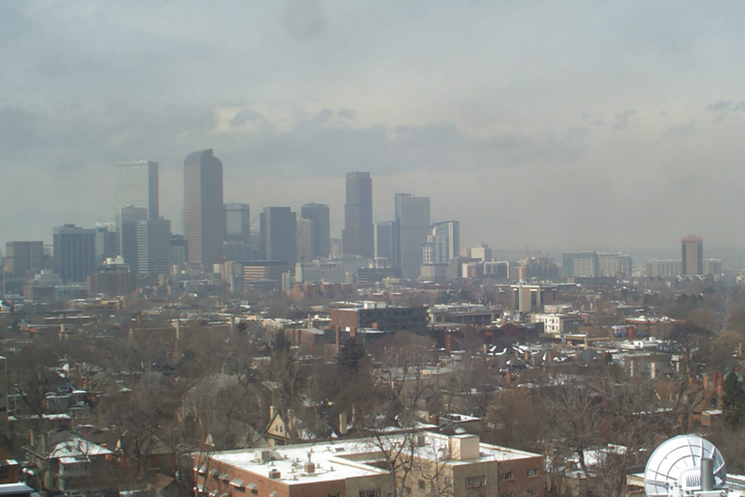
CDPHE

Audio By Carbonatix
The clean-air regulations enforced by the Environmental Protection Agency can often seem like an impenetrable thicket of jargon and legal minutiae. “As a federal agency, we’re nothing without acronyms,” EPA Regional Administrator Greg Sopkin joked apologetically at the start of a public hearing at the agency’s Denver offices today, September 6.
But as EPA officials heard throughout several hours of public testimony on their pending decision regarding the Denver metro area’s air-quality classification, at the heart of these complicated regulatory battles are the simple, highly personal impacts felt by residents living with the region’s elevated levels of air pollution, which have exceeded federal standards for more than a decade.
“My family lives in eastern Boulder County,” resident Leslie Weise told officials at the hearing. “My fiancé has a fourteen-year-old with Down Syndrome. Since they moved here four years ago, I have watched her health deteriorate. In the last year alone, she has spent double-digit [days] in the hospital with breathing and respiratory problems. We’re trying to determine whether we have to leave the state.”
“Every single day,” Weise added, “I have to worry about ozone and the benzene that comes from Weld County, and wonder how much my family is being impacted, wondering if I’m being irresponsible by keeping my family there and not moving.”
Denver has been in “non-attainment” of the EPA’s National Ambient Air Quality Standards for ozone pollution since the agency revised its limit downwards in 2008. Ozone levels along the Front Range have remained high over the past several years, driven by population growth and a corresponding increase in transportation emissions, as well as emissions from industrial sources like oil and gas facilities.
Today’s hearing allowed members of the public to weigh in on whether the agency should reclassify the Denver region as a “serious” violator of EPA standards, a designation that applies to areas that have been in non-attainment for more than nine years, and triggers a series of stricter regulatory requirements. But it came only after an environmental group sued the agency in federal court over delays, and activists have questioned why the EPA has launched a drawn-out rulemaking process for what they argue should be an automatic decision.
“The only question facing the EPA is whether the number 79 is higher than the number 75,” said Center for Biological Diversity attorney Robert Ukeiley, referring to the Denver region’s recorded ozone levels, in parts per billion, versus the federal standard. “That’s the only question we’re here for today. It would be laughable that it’s taking the government this long…but for the fact that children are getting poisoned.”
Opponents of the “bump up” to “serious” non-attainment at Friday’s hearing included representatives of the Colorado Oil and Gas Association and elected officials from Weld County, who worry that the stricter regulations triggered by the reclassification could hurt northern Colorado communities that depend on the fossil fuel industry.
“Weld County is 100 percent committed to protecting air quality, but also to protecting the economic prosperity of its residents and businesses,” said county commissioner Scott James. “We urge EPA to modify its proposed rule accordingly.”
Opponents asked the agency to delay a final decision and give the region until 2021 to come into compliance with NAAQS limits. But Linda McKibben, a nurse from Erie, told officials that the many patients she treats for respiratory issues on a daily basis can’t afford to wait.
“I go into multiple rooms each shift, too many of them have the diagnosis of ‘respiratory exacerbation,'” McKibben said. “So I have to go into room 215 and say, ‘Wait, I’ll call respiratory; COGA needs [until] 2021.’ When I go to room 216 and I’m bumping up the oxygen from four to six, and we’re thinking of ICU – wait, COGA needs till 2021.”
The EPA is accepting written comments regarding the reclassification until September 16, but hasn’t yet given a timetable for its decision. Supporters of the proposed downgrade fear that the agency will continue to drag its feet.
“By delaying action, EPA is endangering people,” said Ukeiley. “EPA should make its final decision very quickly, within a matter of days.”